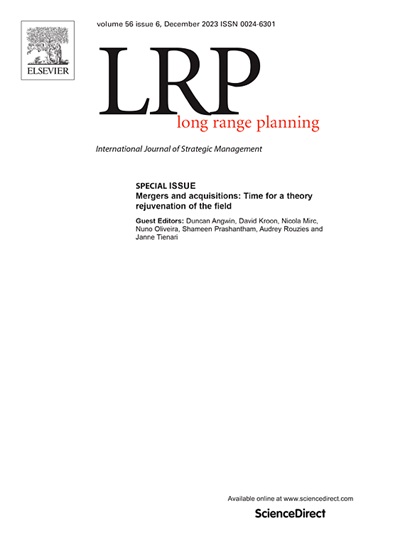Persistence in mobile app ecosystems: App longevity via updates and the role of complementor specialization
IF 6.3
2区 管理学
Q1 BUSINESS
引用次数: 0
Abstract
Digital platform app developers (i.e., complementors) must maintain a high pace of change in their apps to secure their survival in a platform's dynamic competitive context. However, not all app design changes help extend an app's survival time on the platform. Complementors can employ platform-specific competitive logic by updating their apps with new features that utilize network effects, such as introducing connectivity between focal app users and interconnectivity with the users of different apps. To increase our understanding of the effect of app updates on app longevity, I theorize that app updates are competitive technology actions that can employ a winner-take-all competitive logic at the complementor app level if they introduce app features that utilize network effects. Complementor specialization is known to attenuate app longevity. However, this strengthens the positive effect of app updates on app longevity. Support for these hypotheses was found in a panel dataset comprising three million Android applications observed on the Google Play Store. This study contributes to the growing body of research on app level competition on digital platforms by investigating app longevity and the role of complementor specialization. It advances a longevity strategy for complementors' apps by utilizing the network effects in complementors' apps and their specialization.
移动应用生态系统的持久性:通过更新和互补专业化的作用来延长应用寿命
数字平台应用开发者(即互补者)必须保持应用的快速变化,以确保他们在平台动态竞争环境中生存。然而,并非所有的应用设计变化都有助于延长应用在平台上的生存时间。互补者可以采用平台特定的竞争逻辑,通过使用网络效应的新功能来更新他们的应用,例如在焦点应用用户之间引入连接,以及与不同应用的用户之间引入互联。为了加深我们对应用更新对应用寿命的影响的理解,我认为应用更新是一种竞争性的技术行为,如果应用更新引入了利用网络效应的应用功能,就会在互补应用层面采用赢家通吃的竞争逻辑。互补性专门化会缩短应用的寿命。然而,这加强了应用更新对应用寿命的积极影响。我们在b谷歌Play Store上观察到的包含300万个Android应用程序的面板数据集中发现了对这些假设的支持。本研究通过调查应用寿命和互补性专业化的作用,为数字平台上应用级竞争的研究做出了贡献。通过利用互补应用的网络效应及其专业化,提出了互补应用的长寿策略。
本文章由计算机程序翻译,如有差异,请以英文原文为准。
求助全文
约1分钟内获得全文
求助全文
来源期刊

Long Range Planning
Multiple-
CiteScore
13.00
自引率
7.10%
发文量
75
期刊介绍:
Long Range Planning (LRP) is an internationally renowned journal specializing in the field of strategic management. Since its establishment in 1968, the journal has consistently published original research, garnering a strong reputation among academics. LRP actively encourages the submission of articles that involve empirical research and theoretical perspectives, including studies that provide critical assessments and analysis of the current state of knowledge in crucial strategic areas. The primary user base of LRP primarily comprises individuals from academic backgrounds, with the journal playing a dual role within this community. Firstly, it serves as a platform for the dissemination of research findings among academic researchers. Secondly, it serves as a channel for the transmission of ideas that can be effectively utilized in educational settings. The articles published in LRP cater to a diverse audience, including practicing managers and students in professional programs. While some articles may focus on practical applications, others may primarily target academic researchers. LRP adopts an inclusive approach to empirical research, accepting studies that draw on various methodologies such as primary survey data, archival data, case studies, and recognized approaches to data collection.
 求助内容:
求助内容: 应助结果提醒方式:
应助结果提醒方式:


